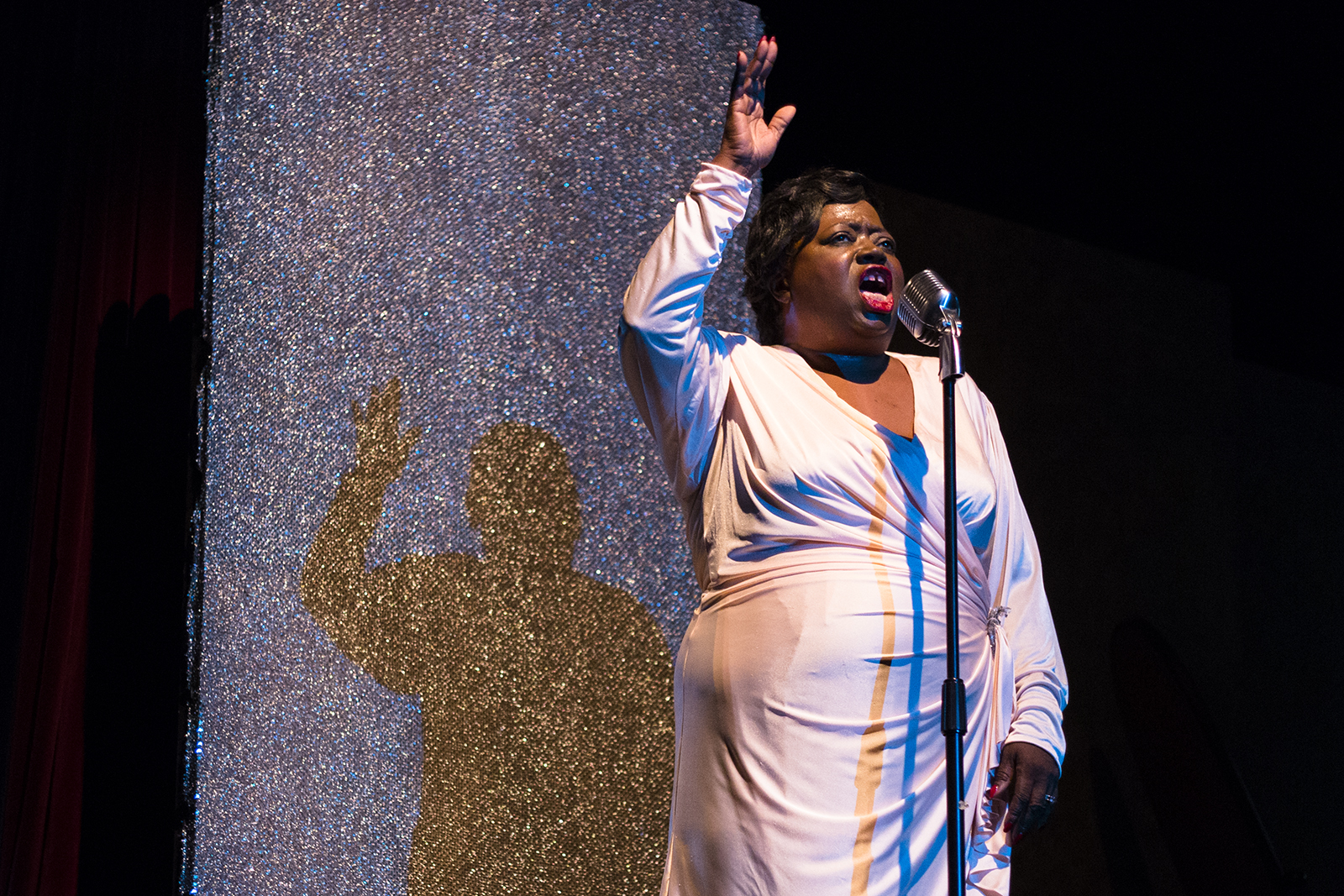Theater Review: ‘Hattie…What I Need You to Know’

(Kelsey Kong/Daily Bruin)
By Sam Bozoukov
April 13, 2015 4:59 a.m.
The actress belts out her verses with blues music playing in the background, reverberating in Schoenberg Theater with each low thunderous note.
The performer sings of the horrors and ironies that infiltrated the movie industry in the early 20th century. She felt it was her duty to stick to her black heritage rather than changing herself for the predominantly white-based Hollywood scene.
“Hattie…What I Need You to Know” is a one-woman musical play starring Vickilyn Reynolds, who also wrote and produced the show, which ran Saturday and Sunday in Schoenberg Hall. The play is centered on the real life story of Hattie McDaniel, the first black woman to win an Academy Award for her role as Mammy in 1939’s “Gone with the Wind.”
This play originally debuted last month to commemorate Women’s History Month. The story celebrates and tells McDaniel’s life from childhood to death, told through her point of view and songs. The success of this play is due solely to Reynolds’ exceptional performance of portraying McDaniel.
The entire play is told as one large monologue. This means that Reynolds is speaking to the audience the entire time, telling the audience specific anecdotes of McDaniel’s entire life. It’s a bit risky considering dialogue among characters are usually pretty important in the advancement of plots.
However, Reynolds makes it work. She’s like the long-lost grandma everyone wishes they had – sweet, sassy and sharp. Her anecdotes were descriptive and interesting. It felt more like a Sunday supper back home than a play.
Additionally, Reynolds’ interpretations of different characters who were involved in McDaniel’s life brought layers to her story, especially her comedic interpretation of McDaniel’s father. Reynolds’ gamut of voices and mannerisms made the extended monologue interesting.
From the beginning to end, McDaniel’s narrative voice changed and developed through her range of imitations and mannerisms. In the beginning, Reynolds employed a more childish tone, mimicking McDaniel as a child, and by the end, her tone is that of a wise old woman nearing the end of her life.
With that being said, the development of McDaniel’s narrative voice couldn’t stop the nonstop monologue from feeling dry at parts. Some anecdotes felt too long, unimportant or simply uninteresting. It was in these moments that things like dialogue among characters were missed.
Equally distracting were some of the background noises during the anecdotes. Some noises included wind and school bells ringing to indicate changing settings. These noises tended to be too loud and took away from the authenticity of Reynolds’ voice.
To combat this, the play finished each anecdote with a song, where Reynolds shined brightest.
The music is faithful to the era and comprised of mostly blues and swing tunes. The soundtrack is a delight for those who dream of the roaring ’20s. Perhaps the best song of the play is “I’m All Alone,” which felt more spiritual and choir-like.
Regardless of song choice, it’s Reynolds’ voice that stunned. The audience applauded every musical performance because each one was singularly poignant and breathtaking.
The play also included photos of the real McDaniel in the background as well as a clip from her Academy Award acceptance speech. These little additions elevated the story as it gave a look into the actress’s real life.
In a matter of 90 minutes, the audience got a glimpse at the film industry of the 20th century and how it handled race from the perspective of one of the greatest actresses of the time period. The play didn’t preach, but its authentic and humorous point of view gave the audience a glimpse of the discrimination McDaniel experienced.
It’s a noteworthy story told in an unconventional way, leaving audiences informed and mindful of the racial injustices that attempted to stall the success of a pioneer in the Los Angeles film industry.


